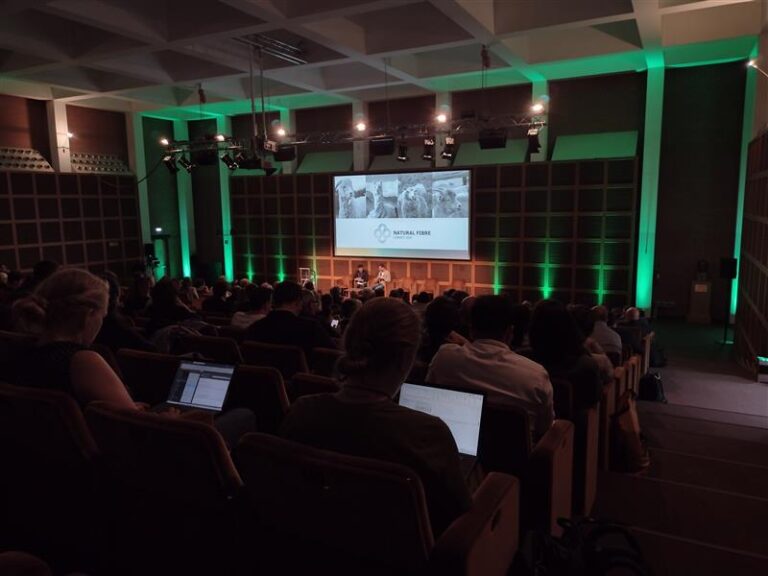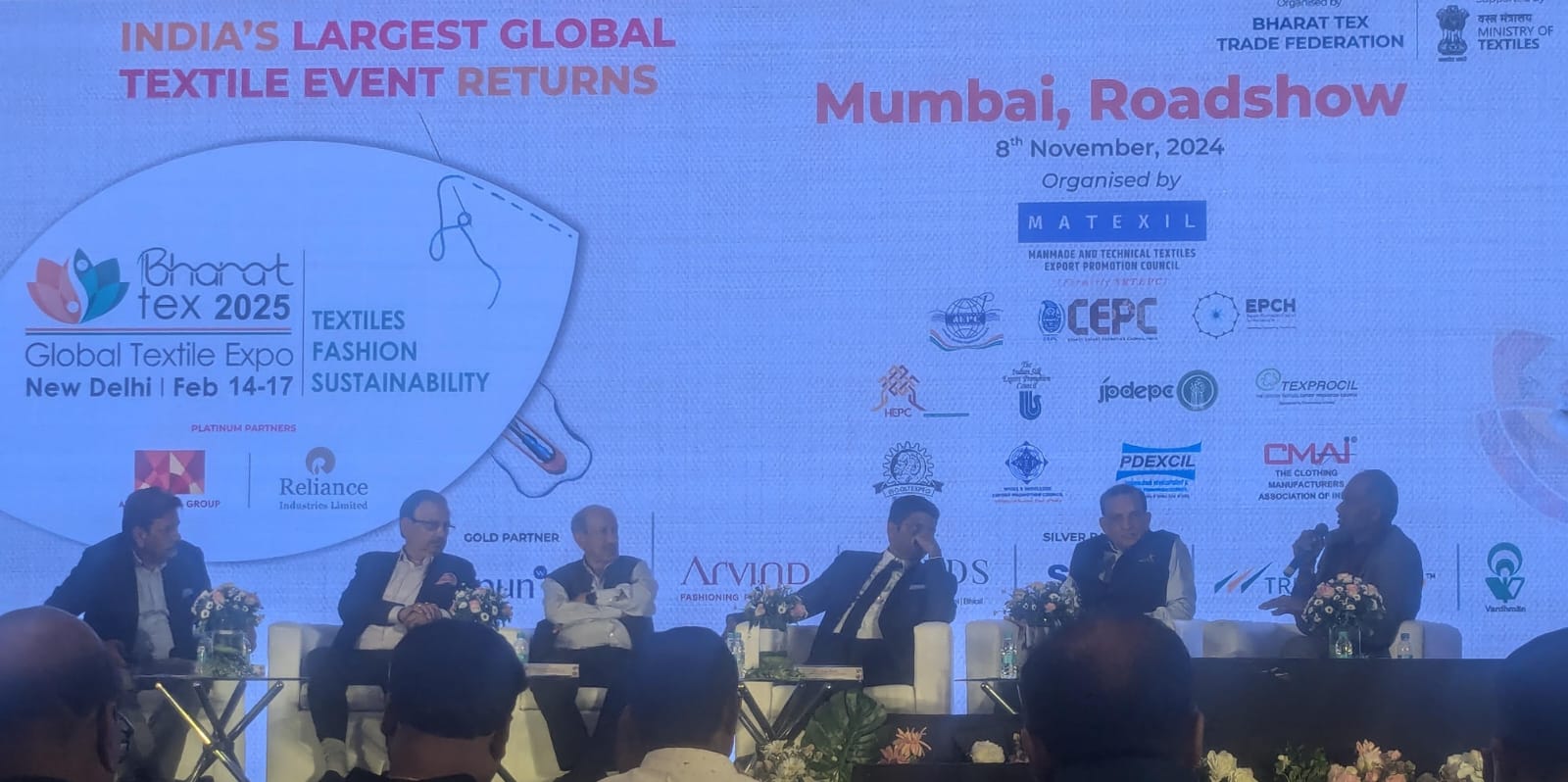FW
Launched by the Organic Cotton Accelerator (OCA) in partnership with the Global Organic Textile Standard in Sept 2024, the #BehindTheSeams campaign attracted participation from over 290 brands across the world.
The 2nd annual campaign featured daily giveaways from fashion, soft home and other textiles brands. Home brands who participated in bedding giveaways included Naturepedicand Mungo. Highlighting ‘organic in-conversion’ farming, the #BehindTheSeams campaign urges brands to support farmers during the critical transition period. OCA provides critical resources such as capacity-building, premium payments and market linkages.
The organisation collaborated with over 35,000 in-conversion farmers in Indiaand Pakistan during the 2023-2024 cotton season as a part of a broader program that supports over 80,000 farmers. This collaboration was facilitated by 16 brands who participated in OCA’s Farm Program.
At an event in Leh, Giriraj Singh, Union Minister for Textiles, presented Brigadier (Dr) BD Mishra, Lieutenant Governor (Retd) with the Certificate of Geographical Indication (GI) Registration for Ladakh’s renowned Pashmina wool. The GI tagging would prevent Kashmiri traders from falsely marketing Ladakh's prized Pashmina wool as their own, said Singh.
Emphasising the benefits of this GI recognition for the people of Ladakh, especially the Pashmina herders, Singh said, herders would greatly benefit from this GI recognition as though known as ‘Soft Gold,’ Ladakh’s Pashmina wool has historically been misused by others promoting it under a different identity.
Emphasising on the importance of supporting Pashmina and Merino sheep stall feeding, Singh urged the government to increase the production of Pashmina wool in Ladakh, ensuring higher revenue for goat herders. Helauded the efforts of the Union Territory Administration to reduce the mortality rate among Pashmina goat offspring.
Further, Singh proposed measures to further strengthen the Pashmina wool industry in Ladakh. These included establishing Pashmina breeding farms in Leh and Kargil to prevent inbreeding, promoting artificial insemination, and launching selective breeding projects. He also suggested holding competitions among farmers for best practices, offering incentives, testing the nutritional value of Pashmina goat milk, and improving fodder by making feed pellets from stocked supplies.
Hailing the GI registration of Ladakh’s Pashmina Wool as historic milestone, Mishra criticized the sale of inferior or fake Pashmina products as having previously undermined the authenticity of Ladakh’s top-quality Pashmina wool. He urged the Ministry to support the further development and promotion ofLadakh’s Pashmina industry. He also stressed on the need to encourage young people to participate in the traditional practice of Pashmina goat herding, preserving this age-old culture.
The Global Fashion Agenda (GFA) has launched a new initiative to support stakeholders to foster a circular textile industry in Indonesia.
Titled, ‘Circular Fashion Partnership: Indonesia,’ the initiative has been launched in partnership with Rantai Tekstil Lestari (RTL) Indonesia. It is supported by implementation partners Reverse Resources, Closed Loop Fashion, and Circle Economy Foundation, and funded by H&M Foundation and contributions from the private sector.
The initiative urges brands, manufacturers, waste handlers, recyclers and government agencies to actively participate in the collective action program to achieve impact at scale.
A cross-sectorial initiative, The Circular Fashion Partnership: Indonesia aims to develop effective circular fashion systems by capturing and recycling post-industrial textile waste. The program seeks to minimise virgin resources use by increasing the availability of recycled materials. The program organises raining sessions and working groups for brands, local manufacturers, waste handlers, recyclers, and knowledge institutes to help promote best practices and educate industry stakeholders on the principles of the circular economy.
Project national lead, RTL ensures, the program is customised to the local context and includes all local stakeholders. It also confirms the program’s alignment with government’s strategy, and its connection with the right ministries to help bridge the identified policy gaps.
A request by Reliance Industries has led to the Ministry of Commerce and Industry-led Director General of Trade Remedies (DGTR) launching an anti-dumping investigation into the import of mono ethylene glycol (MEG) from Kuwait, Saudi Arabia, and Singapore. A key textile material, MEG is used to produce polyester staple fibre (PSF).
A significant producer of polyester staple fiber through the Chemicals and Petrochemicals Association of India (CPMA), Reliance has raised concerns over the impact of imported MEG on the domestic industry.
Accusing the above-mentioned countries of dumping MEG imports into India at prices below normal value, CPMA alleges, this not only causes material injury to domestic producers but also threatens the industry’s future viability. With the support of Indian Glycol, the association has called for imposition of an anti-dumping law on the material’s imports.
In response, DGTR will examine MEG imports from Apr 01, 2023, to Mar 31, 2024, while it will also make an injury assessment of the fiscal years 2020-21, 2021-22, and 2022-23. The exact production costs in the countries under investigation are not publicly available. However, the significantly lower export prices suggest dumping practices, says CPMA
Though anti-dumping measures typically aim to protect domestic producers, they could potentially hurt downstream industries, such as garment, fabric, and yarn manufacturers, that rely on MEG imports. Raising production costs for these sectors, anti-dumping duties reduce their competitiveness in the global market.
The Northern European fashion retailer C&A recycles denim leftovers from its own factory in Moenchengladbach, Germany into a new flooring material.
Specially designed for retail environments, the flooring material is made by recycling about 80 per cent of leftovers that include jeans fabrics, cork underlays from the bottle industry and wooden boards processed using natural products such as vegetable fats and natural rubber. The fibers are produced by the Swiss family-run company Lico using natural products such as vegetable fats and natural rubber. Moreover, the company uses energy from renewable sources, including a photovoltaic system and local hydropower plants.
The jeans flooring has been awarded with Environment Product Declaration (EPD) and the Blue Angel Award. It also won the Green Collection Award 2023.
The company providing the jeans scraps, the C&A FIT (Factory for Innovation in Textiles), is a pioneering facility in Mönchengladbach, Germany. Opened in 2021, the factory manufactures around 1,000 pairs of jeans every day using advanced automation, digitalisation and electricity from renewable sources. The factory also conserves water by using only 10–15 liters per a pair of jeans compared to the industry standard of 70 liters.
Indonesia will maintain its ban on e-commerce platform Temu, citing concerns over its potential impact on local micro, small, and medium enterprises (MSMEs).
Communications and Informatics Minister Budi Arie Setiadi stated that Temu's business model, which involves direct sales from factories to consumers, violates Indonesian trade regulations. The platform, owned by PDD Holdings, was deemed harmful to the economy and local businesses.
Minister Budi emphasized the government's commitment to ensuring that the digital space benefits society, rejecting platforms that could negatively affect MSMEs. Temu's repeated attempts to register in Indonesia since September 2022 have been unsuccessful, with authorities blocking its entry due to trademark conflicts and policy concerns.
Temu, which has expanded across Southeast Asia, continues to face resistance in Indonesia, following similar actions against TikTok Shop last year.
Kim Glas, President and CEO of the National Council of Textile Organizations (NCTO), has called on President Biden to intervene in the ongoing strike at East and Gulf Coast ports. In a letter, Glas highlighted the damaging effects of the strike on the US textile industry, which is already struggling due to Hurricane Helene.
Glas stressed the urgent need for a resolution, stating the strike threatens both domestic competitiveness and the broader textile and apparel co-production chain in the Western Hemisphere, which supports 2 million workers and $40 billion in trade.
With 70 per cent of US textile exports going to Western Hemisphere free trade partners, the disruption is impacting critical supply chains. Glas also noted the hurricane's devastation, which has left some companies with severe damage and others with halted operations.
The industry has already seen 21 plant closures in the past 18 months, making this strike even more damaging. Glas appealed to President Biden for immediate action to prevent further disruptions and protect the industry’s recovery efforts.

India's pivotal role in the global natural fiber industry took center stage at the Natural Fiber Connect (NFC) conference held in Biela on September 19-20, 2024. Discussions and presentations highlighted India's significant contributions to sustainable fiber production and its commitment to eco-friendly practices. The conference, which brought together industry leaders, researchers, and policymakers from around the world, showcased India's rich heritage in natural fibers such as cotton, jute, silk, and coir. Speakers emphasized the country's efforts to promote sustainable farming practices, support farmer livelihoods, and develop innovative fiber-based products.
Wide focus on India during discussions
Presentations and discussions emphasized India's vast and diverse production of natural fibers, including cotton, jute, silk, wool, and coir. India's position as a leading producer of several of these fibers underscores its vital role in the global natural fiber industry.
The conference also highlighted India's commitment to sustainable practices in fiber production and processing. Innovative approaches, such as organic farming and the use of natural dyes, were showcased, demonstrating India's leadership in environmentally responsible fiber production. The discussions underscored the significant economic and social impact of the natural fiber industry in India, particularly in rural communities. The sector provides livelihoods for millions and contributes substantially to the country's economy.
Several speakers underscored the importance of supporting smallholder farmers who form the backbone of India's natural fiber industry. The conference highlighted programs aimed at providing farmers with access to training, technology, and fair market prices
The NFC served as a platform for fostering collaboration and partnerships between Indian stakeholders and their global counterparts. The conference emphasized the importance of knowledge sharing, technology transfer, and joint initiatives to further advance the natural fiber industry.
The conference concluded with a positive outlook on India's future in the natural fiber industry. With its vast resources, skilled workforce, and commitment to sustainability, India is poised to play a leading role in meeting the growing global demand for eco-friendly fibers.

The Indian home textile industry is on the cusp of a remarkable revival, with projections indicating an 8-10 percent sales growth for the fiscal year 2024-25 (FY25). This positive outlook comes after a challenging period in FY23, and it's attributed to a combination of key change factors, reveals a report by the credit rating agency CareEdge Ratings. This positive outlook is driven by a number of factors like: stable raw material prices, improvement in demand from key importing nations, and robust domestic consumption.
Several factors have led to the growth spurt. For example, rising per capita income with higher disposable incomes consumers are willing to spend more on discretionary items like home decor and textiles. Rapid urbanization is another factor as the ongoing shift of population to cities is driving demand for housing and, consequently, home furnishings. A buoyant housing sector is further boosting demand for home textiles. And more importantly, greater hygiene awareness is another growth driver as the COVID-19 pandemic has heightened awareness about hygiene, leading to increased consumption of home textiles.
Navigating a turbulent time
The past three years have been a rollercoaster ride for the Indian home textile industry. After a major demand surge in FY22, due to pandemic-induced lockdowns and increased consumer spending on home improvement, the sector faced significant challenges in FY23.
Table: Growth trends over the years
|
Fiscal year |
Key trends |
Growth (%) |
Challenges |
|
FY22 |
High demand, increased exports |
Strong |
Rising raw material prices, supply chain disruptions |
|
FY23 |
Demand slowdown, inflationary pressures |
Moderate |
High freight costs, geopolitical uncertainties |
|
FY24 |
Recovery in demand, stable raw material prices |
Strong |
Elevated freight costs, inflationary pressures persist |
Catalyst to change
CareEdge Ratings highlights several key factors contributing to the projected growth.
Stable raw material prices: After a period of volatility, cotton prices are expected to stabilize, providing much-needed relief to manufacturers.
Improved demand from key export markets: As major economies recover, demand for home textile products from key export markets like the US and Europe is anticipated to improve.
Growth in domestic consumption: Rising disposable incomes, increasing urbanization, and a growing preference for branded products are driving domestic demand.
Government initiatives: Supportive government policies, such as production-linked incentive (PLI) schemes, are encouraging investment and expansion in the sector.
Table: Home textile sector growth rate
|
Year |
Growth rate |
Key Events |
|
FY22 |
5% |
Steady growth driven by pre-pandemic economic conditions |
|
FY23 |
-2% |
Decline due to COVID-19 disruptions and supply chain issues |
|
FY24 |
3% |
Recovery initiated as the pandemic effects subsided |
|
FY25 (Projected) |
8-10% |
Significant growth anticipated due to key change factors |
In fact, several home textile companies in India are already reaping the benefits of this favorable market environment. For example, Welspun India, the leading player has reported a strong increase in sales in recent quarters, driven by both domestic and export demand. Bombay Dyeing, the established brand has successfully repositioned itself to cater to the evolving preferences of urban consumers. Indo Count Industries, the export-oriented company is capitalizing on the growing global demand for Indian home textiles.
It maybe noted that the growth of the Indian home textile sector is in sync with global trends. The global home textile market was valued at $122 billion in 2023 and is expected to reach $134 billion by the end of 2024. It's projected to grow at a CAGR of 5-5.5 per cent to reach $185 billion by 2030. India, with its strong raw material base, skilled workforce, and competitive manufacturing capabilities, is poised to play a key role in this expanding market.
The Indian home textile sector is set for a strong growth path in coming years. The convergence of various factors, both domestic and global, is creating a conducive environment for businesses. Companies that can adapt to the changing market dynamics and leverage their strengths are likely to thrive in this promising landscape.
The Maharashtra Government has signed an MoU with OFAB Tech to set up a state-of-the-art textile facility in Wardha, Maharashtra.
To be set up with an investment of Rs 750 crore, the facility will help boost the textile sector in Vidharbha besides catalysing rapid industrial development in Wardha, says Devendra Fadnavis, Deputy Chief Minister.
Focusing on empowering local communities, the project will be executed on a hub-and-spoke model, extending its benefits to the rural areas surrounding Wardha. It will provide employment opportunities to both skilled and semi-skilled workers, ensuring the benefits of industrialisation reach a wide range of the local population.
By selecting Wardha for the establishment of this facility, the government aims to ensure a balanced regional development across the state, opine local industrialists. The city’s strategic position and untapped potential make it ideal location for the establishment of a new textile hub in the state.












